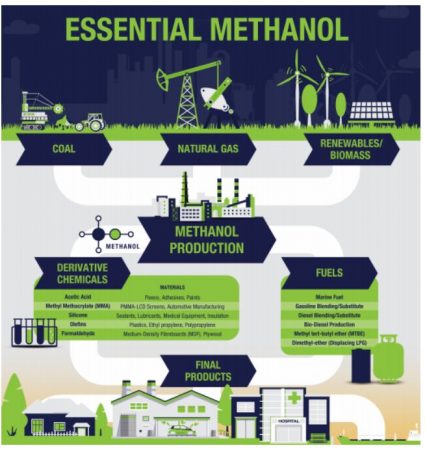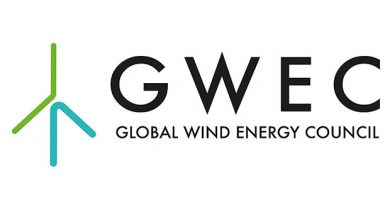Methanol supports the immediate adoption of hydrogen

By – Prakriti Sethi, Chief India Representative
With the countries pledging to achieve ambitious climate goals at COP26 last year, there is a stronger and more immediate need to decarbonize economies. As a last-ditch effort to keep global warming to 1.5 degrees celsius, the countries are gearing up to mitigate and reduce their impacts on the environment.
As the only G20 nation to be on track to achieve the nationally determined climate goals, India has announced several renewable energy initiatives in a bid to transition to a green and sustainable economy. When delivering the Independence Day speech of 2021, Honorable Prime Minister Narendra Modi, launched the ambitious and promising National Hydrogen Energy Mission (NHEM) indicating that hydrogen will play an important role in combating climate change. To achieve realistic goals, it is important for India to focus on adopting a progressive roadmap involving practical solutions that can lead to the realization of the country’s hydrogen aspirations. Methanol is a solution that is available today.

Methanol is a chemical building block for everyday products such as paints, carpeting, plastics, etc. Increasingly, methanol is being employed as an emerging energy product to fuel cars and trucks, marine vessels, boilers, cookstoves, and kilns. Adding to methanol’s growing list of market applications, it is also utilized as a superior hydrogen carrier. As one of the most versatile chemical commodities and energy sources available today, methanol facilitates the transition to a sustainable future of green economies and enables the development of hydrogen economies. Methanol offers the following advantages that enable the faster adoption of hydrogen:
- Simple: Liquid at ambient temperature and pressure, methanol is easy to store and transport over long distances without the need for compression or cryogenic technology. Methanol utilizes the existing infrastructure to ensure last-mile delivery to end-users. Underground pipes, storage tanks, and filling stations will have to be constructed across the country to support wide-scale adoption of hydrogen. As a liquid hydrogen carrier, methanol can lower the cost of infrastructure needed to transport, store, and dispense hydrogen safely over long distances
- Efficient: Methanol-to-hydrogen reforming process consumes considerably less energy than the production of hydrogen from electrolysis of water. Water electrolysis consumes 50 to 55 kWhr electricity/kg hydrogen whereas methanol reforming consumes <0.04 kWh electricity/kg hydrogen that at a higher energy efficiency of 84% LHV (Lower Heating Value). Also, the high intermittency of renewable energy sources is a challenge when there is a lack of appropriate energy storage technologies, particularly for renewable electricity. Power-to-liquid technologies offer a promising solution, where excess renewable electricity can be stored in the form of methanol. This generates greater economic value in renewable energy assets and de-risks the investments needed to increase the country’s renewable energy capacity.
- Now: Methanol has been safely being produced, stored, and transported for more than half a century. The development of infrastructure that supports the safe handling of methanol has enabled globally recognized standards and guidelines on its safe handling. As a globally traded commodity, methanol has a mature supply chain that supports the safe delivery of methanol as a hydrogen carrier. It is an immediate solution for the present and the future.
- Green: Methanol is the simplest alcohol, has no carbon-carbon bonds, and contains an oxygen atom in its molecule. This enables to offer cleaner combustion that virtually eliminates particulate matter and sulfur oxides while reducing nitrogen oxide emissions by up to 60%. Methanol can also be a product with extremely low carbon intensity when it is produced from renewable feedstocks such as biomass, municipal solid waste (MSW), and captured carbon dioxide. When produced with renewable feedstocks, renewable methanol can be a carbon-neutral or carbon-negative energy product.
With such benefits, methanol is an attractive energy enabler that addresses key concerns for Indian consumers. The logistical ease that comes with methanol addresses both access to energy and affordability issues. Its ability to be integrated with existing infrastructure will effectively reduce the cost of logistics and simplify transport of clean energy to regions that require it. It is widely recognized that methanol is an excellent hydrogen carrier and a viable future-proof fuel that will support the transition towards energy greater security and sustainability.
Methanol’s adoption as a hydrogen carrier allows the Indian economy to build the foundation of its future hydrogen economy. Investments in methanol production, utilization, and infrastructure supporting its logistics will contribute to a future hydrogen economy and deliver immediate economic returns today. The Indian government has been supportive of methanol, and this support can extend towards methanol’s role as a strategic hydrogen carrier in India.




